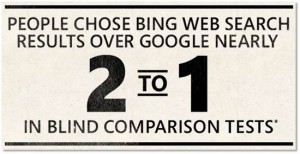
Here’s another interesting fact about Bing: It definitely returns different results from a Google search of the same terms. In comparing the first page of results for the same search term on Bing and Google, Searchmetrics found that just 24.7% of the URLs and 37.3% of domains were the same. We can’t assume that optimizing your content for Google will also optimize it for Bing.
Here are 7 things about Bing to keep in mind when developing and marketing your content:
1) Keyword rich domain names no longer boost SERPs rankings. While this is not big news, we note it because earlier this year, Bing’s Senior Product Manager, Duane Forrester, came out and said so on Bing’s webmaster blog.
2) Given the above, there is no longer a need to pay big bucks for the perfect domain name. Furthermore, when you buy a domain name you never know how it was used before. Your shiny, new domain could have a bad history. If you decide you must have that particular name, check the Wayback Machine to see what kind of content it had previously.
3) As with Google, quality content is what matters most.
- Write for people, not algorithms.
- Avoid keyword stuffing. Otherwise, Bing will punish your content.
- Proofread before posting. Double check to be sure you’ve avoided poor grammar and typos, as they lower your ranking.
4) Bing has teamed up with Klout to create Klout-verified snapshots in the SERPs that are similar to Google’s rich snippets. Content authors who have strong Klout profiles are likely to be ranked higher than those who don’t.
5) Social icons also appear in Bing SERPs, so it is important to maintain engaging social media pages. Inserting links to your content in social posts is also helpful. Pay special attention to Facebook, Twitter and Google +.
6) Backlinks Matter. The analysts at Searchmetrics found that backlink numbers are closely associated with higher rankings in Bing, so cultivating quality backlinks remains a good idea. (This seems to be less true for Google.)
7) That same Searchmetrics study also reported that on-page technical factors, such as H1 headings and site speed, while not directly responsible for good rankings, so play a role in boosting content that already ranks.
It’s clear that Bing is not going to unseat Google as the number one search engine, at least not in the near future. Keep in mind, though, those 3.3 billion individual searches. Why shouldn’t your content be getting in front of those users too?
Anyway, as you all know, I am a BIG Google fan but I have learned in the past that you never want to ignore the underdog. They may not always be the case.